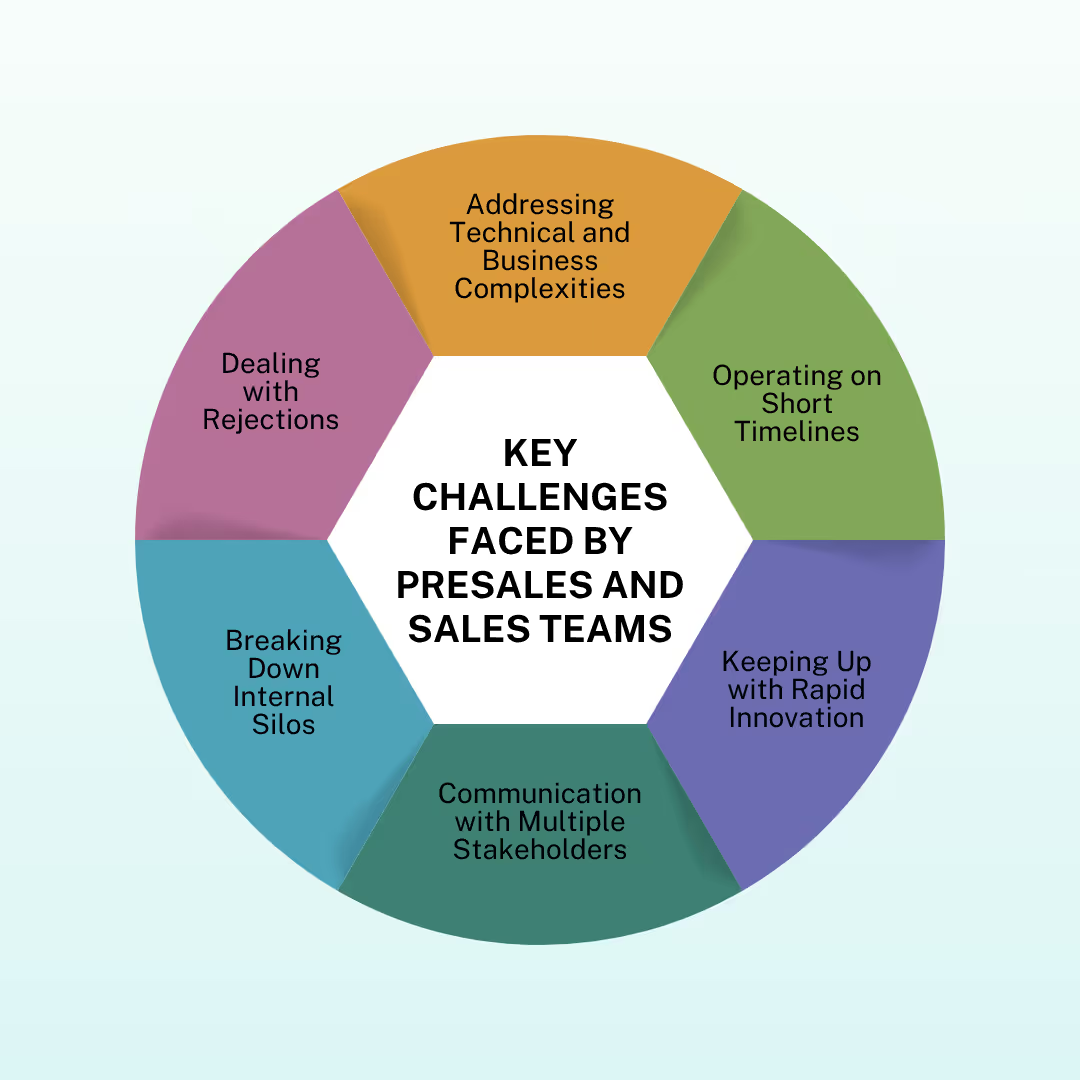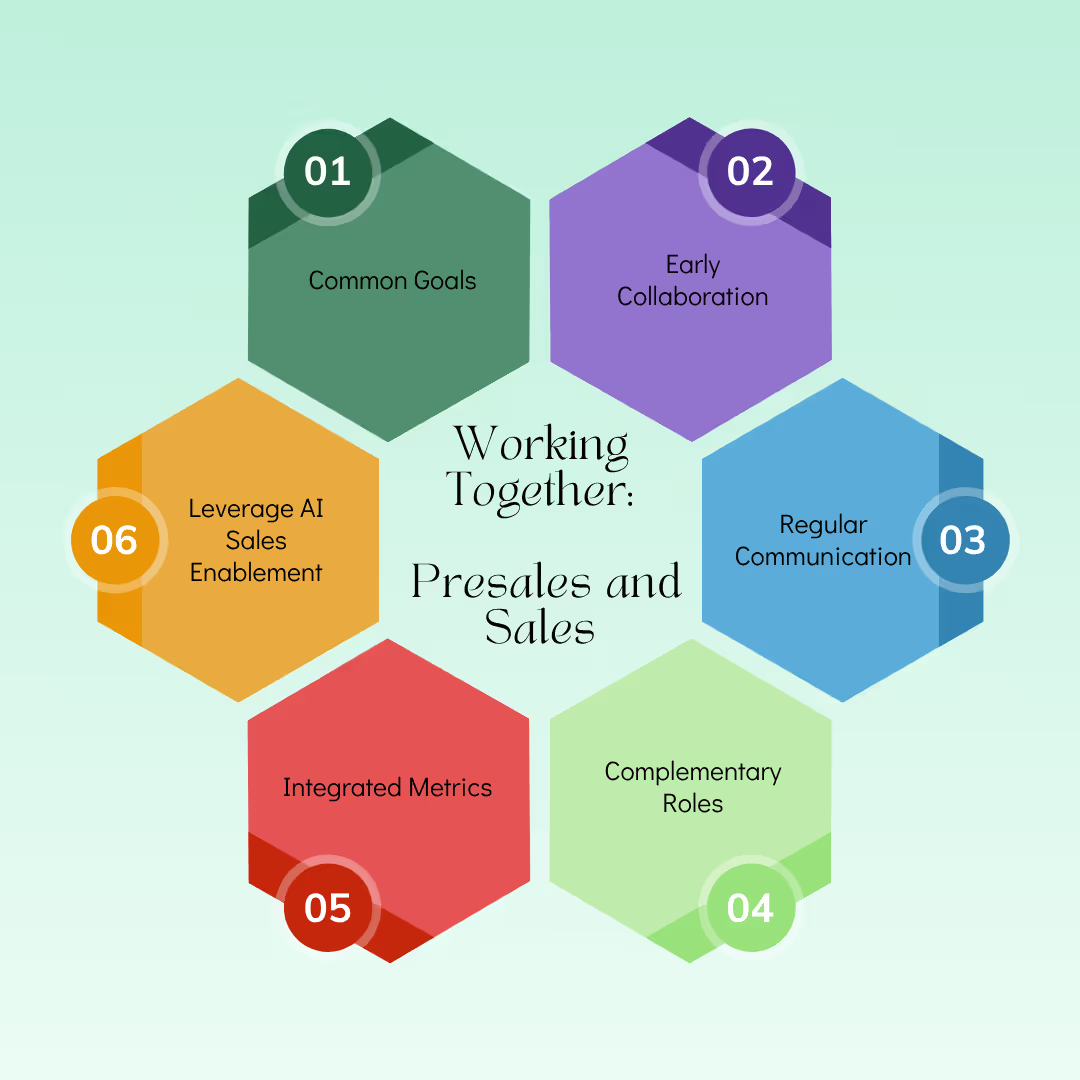Presales and Sales: The Selling Success Dynamic Duo
Imagine this scenario: A company is selling a risky project to a potential customer. The salesperson walks into the meeting with confidence, bringing charm and in-depth knowledge of the client's company. The client starts asking technical questions about the product's ability to be customized, integration challenges, and ROI specifics. The sales representative stumbles, having no clue about the technicalities. Along comes the presales consultant who effortlessly answers the client's questions, shows them the solution, and customizes the pitch to meet the client's needs. They close the deal.
This scenario illustrates a common yet often misunderstood relationship: the presales and sales functions. Most firms borrow from too wide a line in segmenting these roles, although their separate contributions are required to achieve maximum success. Companies with highly developed presales functions consistently achieve win ratios of 40–50% for new business and 80–90% for renewal business, far above average levels. This in itself underlines the imperative role of a well-defined presales function.
Let us delve into more detail regarding these roles, their respective tasks, and how their coordination evolved historically to redefine business outcomes.

A Historical Perspective
The sales/presales distinction is nothing new. It arises as a consequence of the 19th-century industrial and 20th-century technological revolutions, when businesses began to sell increasingly complicated products.
The Industrial Revolution: The Dawn of Specialization
During the nineteenth century, when businesses were transforming from producing handmade goods to mass-produced ones, goods themselves turned more technical. To cite but one instance, firms that sold steam engines or electric apparatus needed more than mere convincing salespeople. They required technologists to explain to them how these technologies worked and integrated into the buyer's manufacturing. This type of labor was the initial seed of what we now call presales, a dedicated position to help with the technical aspects of a sale.

The Emergence of Technology in the 20th Century
Fast forward to the mid-20th century, where organizations began using technologies like telecommunication systems, mainframe computers, and enterprise software. In order to sell these solutions, a fresh technological understanding was necessary. For instance:
- IBM famously trained a specialized team to design and present computing solutions to clients, laying the foundation for modern presales roles.
- By the 1980s, the advent of software companies like Oracle and SAP was an indication in itself that it was critical to have a technical counterpart to sales. They introduced proof-of-concept demonstrations, technical workshops, and solution architecture as core components of the sales process.
With increasing sophistication in products and services, the presales vs. sales distinction became more pronounced, paving the way for the collaborative models today.
What is Presales?
Presales is the backroom hero of the sales process, and they're tasked with filling the gap between a company's solutions and the client's unique needs. Consider presales as the sales process architects, designing and illustrating how a solution maps to the client's universe. Want to know more about the detailed responsibilities? Check out our in-depth guide on What is Presales?
Key Responsibilities of Presales
- Client Discovery: Presales teams delve into the pain points, objectives, and requirements of the client. They do technical conversations to uncover hidden pain areas that may not be realized by sales. Deep discovery calls are a must here.
- Solution Design: Once the needs of the client are met, presales design tailors solutions. This varies from technical demos to developing proof-of-concept (PoC) models.
- Technical Support: Presales are the technical consultants in the sales process, answering in-depth questions, overcoming objections, and verifying feasibility. Their role is just like that of a Sales Engineer in tech sales.
Example:
Suppose a software firm is selling its cloud CRM solution to a manufacturing firm. The presales consultant examines the existing systems of the company and is able to utilize advanced AI sales enablement technologies like Pepsales Copilot to identify where the gaps are and suggest a seamless integration plan. They provide customized live demos of how the CRM is able to track inventory and automate customer interactions. This tailored solution, where companies providing tailored demos see their sales cycle decline by as much as 20% (McKinsey), puts the client at ease, allowing the sales team to close the deal. Learn more about how tailored demos will be your best B2B SaaS success asset here.
Key Challenges Faced by Presales and Sales Teams
Both presales and sales organizations operate in a high-pressure environment, with unique challenges that demand excellent collaboration and advanced tools.

- Addressing Technical and Business Complexities: One of the biggest challenges is fitting highly technical solutions into business-focused conversations. Presales engineers must ensure the solution is technically correct and aligns with cost and time limitations.
- Operating on Short Timelines: Presales teams are usually under heavy time pressure to supply excellent demos, proofs-of-concept, and solutions while meeting last-minute changes in client needs. The typical B2B sales process can be as long as 102 days, and even more for enterprise sales over $1 million (WinSavvy), putting the pressure on speeding up processes.
- Keeping Up with Rapid Innovation: The task of keeping up with the latest technology, industry trends, and product releases is ongoing. Presales must adopt AI sales enablement technology like Pepsales AI to remain ahead of the competition and keep up with shifting customer expectations. In 2024, 65% of companies employed generative AI on a regular basis, demonstrating a pace of rapid adoption (McKinsey 2024).
- Communication with Multiple Stakeholders: Presales engineers must navigate the complexity of providing technical information to non-technical stakeholders in answering particular questions by technical teams. This two-way communication task is most often difficult.
- Breaking Down Internal Silos: Internal alignment may prove difficult. Presales engineers must engage closely with sales, marketing, and product teams to ensure a unified and single message is presented to customers, preventing mismatched expectations.
- Dealing with Rejections: Even with immense technical effort, transactions can be rejected for various reasons. Presales engineers must cope with such letdowns positively, learn from criticism, and maintain motivation and good customer rapport for future prospects.
What is Sales?
Sales is the company's ambassador, the persuasive communicator who generates leads, builds relationships, and drives deals to close. If presales are the designers, then sales are the builders, turning blueprints into reality.

Major Responsibilities of Sales
Prospecting: Sales organizations seek out and qualify potential customers through applicable sales methodologies, ensuring the firm's products and services match their needs. Proper lead qualification takes prime priority.
Relationship Building: The sales professionals establish relationships and rapport with the customers, being the one point of contact throughout the engagement. Strong customer relationship management (CRM) practices are very important.
Closing Deals: They close deals, overcome objections, and gain agreements, generating revenue for the business house. Strong sales negotiation skills are crucial.
Difference with Presales
While sales focus on why the client should choose the company, presales focus on how the solution meets the needs of the client. Sales paint the broad picture; presales fill in the specifics.
To see how presales and sales work together, consider the following example:
A telecommunications firm sought to sell its enterprise-class internet offerings to a large retail chain.
- It was the sales team who opened the door, made contact with the retail chain's decision-makers, and exemplified the business value of their products. However, as soon as the discussion turned technical, the client began to complain about network scalability and integration with their existing IT infrastructure.
- Step in the presales team, who reviewed the chain's current network, recommended detailed migration planning, and illustrated how the solution would keep downtime to an absolute minimum. Their expertise reassured the client, silencing technical and operational concerns.
Through an exercise in using their strengths, the teams tied down a multi-million-dollar opportunity, illustrating that it takes teamwork. For more, read our Pepsales AI Success Stories & Case Studies.
Business Impact: Why the Distinction Matters
Clearly defined sales and presales roles lead to several advantages, impacting a company's bottom line substantially.
Streamlined Processes: With defined boundaries, the teams can leverage their strengths and not duplicate efforts. This leads to streamlined sales cycles. An effective presales process can influence sales success to a great extent.
Improved Client Satisfaction: Clients feel a seamless experience, where sales build relationships and presales deliver technical solutions. This leads to improved trust and long-term relationships.
Increased Revenue: Better collaboration ensures that deals close faster and more confidently with customers, and this drives revenue directly. As mentioned previously, strong presales skills can contribute significantly to improved win rates. Organizations leveraging AI within B2B sales functions experience more than 50% more leads and appointments.
Working Together: Presales and Sales
Presales and sales teams are most effective when they work in harmony. This is how they can align their efforts:

Common Goals: Create common goals such as deal closure, client satisfaction, and technical feasibility.
Early Collaboration: Involve presales early on to reveal customer needs and craft tailored solutions, supporting sales. Leverage models such as MEDDIC or BANT to qualify opportunities collaboratively, facilitating clear visibility into customer pain points and buying decisions. Presales involvement early on helps improve lead qualification and a more predictable pipeline, yielding higher conversion rates.
Regular Communication: Use CRM software like HubSpot to aggregate customer information and make communication easier. This keeps both teams informed of the most up-to-date information, interaction, and customer preferences, eliminating duplicated effort and lost context. Other sales pipeline management software can also be beneficial.
Complementary Roles: Let relationship building and negotiation be done by sales, and technical know-how and solution architecture by presales.
Integrated Metrics: Use shared KPIs to foster accountability and measure success as a team.
Leverage AI Sales Enablement: Platforms like Pepsales AI and Pepsales Copilot can revolutionize this partnership. They offer AI-powered meeting preparation, on-call AI mentoring in real-time, automated deal qualification, and CRM automation, allowing both teams to focus on high-value dialogues and make decisions based on facts. Investing in a sales enablement platform of value can lead to more deal velocity and revenue growth.
Conclusion: The Unavoidable Partnership
Sales and presales are two sides of a single coin that both play vital functions in the sales process. While sales build the client connection and drive deals, presales ensure that solutions presented are technically feasible and are tailored to the client's needs. Both of them are a forceful partnership that fuels business development.
Historically, this alliance has marched in lockstep with technological progress, underscoring the need for specialization in an increasingly complex world. From Industrial Revolution technical specialists to present-day presales consultants, these roles have been instrumental in allowing companies to thrive. Embedding innovative AI sales enablement platforms reinforces this union even more, enabling greater efficiency, customization, and consequently, increased win rates. Gather around to observe how a closer presales and sales union can transform your company.
Book a demo today and unlock your full sales potential with Pepsales!










.avif)
.avif)
